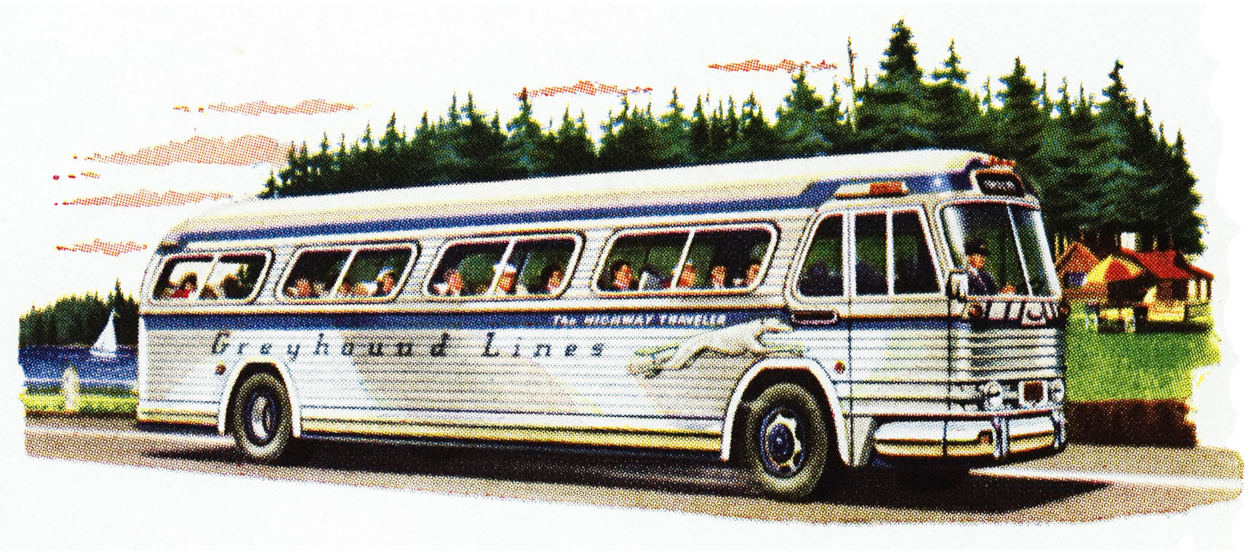The secret beauty of the bus
Buses, with their giant windows and high-seated vantage point on the road, let you see the world as it is


A free daily email with the biggest news stories of the day – and the best features from TheWeek.com
You are now subscribed
Your newsletter sign-up was successful
A long, long, time ago, when I was in college in Washington, D.C., I dated a guy who lived in New York City. Because I was a college student with little money and no car, I'd take the bus to see him — four hours and 30 minutes, give or take, each way, on a Greyhound. In the course of somewhere between eight months and two years of dating (I've blocked it out, much like those bus trips), I grew to despise not only the guy, but also the bus.
When I could afford it, I told myself, those bus days would be forever gone.
Which goes to say: I've put in my time with buses. If I never rode a bus again, I would still have ridden too many buses. Enough bus for me, thanks. I'm bussed out.
The Week
Escape your echo chamber. Get the facts behind the news, plus analysis from multiple perspectives.

Sign up for The Week's Free Newsletters
From our morning news briefing to a weekly Good News Newsletter, get the best of The Week delivered directly to your inbox.
From our morning news briefing to a weekly Good News Newsletter, get the best of The Week delivered directly to your inbox.
But something weird happened. Turns out, I kind of like the bus.
Hear me out.
Trains are elegant, even decadent at times. Planes are fast and get you where you need to go in a way that's unparalleled in public transportation. Cars are nice, you know, if you have access to one — though of course as private transportation they've got their drawbacks, too.
But buses, with their giant windows and high-seated vantage point on the road, let you see the world as it is, an intersection of geography and humanity and groundedness and freedom. Around you are not just your fellow passengers (and their voices and phones and internal dramas and external food), but also cars, stores, neighborhoods, gorgeous vistas, and ugly highways. Because buses take the same roads as everyone else, you're enmeshed in the broader ecosystem as you travel. Buses crisscross America, not just in the major hubs, but also hurtling off to tiny towns and places you'd never think to go.
A free daily email with the biggest news stories of the day – and the best features from TheWeek.com
Yes, the New York City Port Authority — my major bus hub — is a place where you don't want to spend a ton of time, but it's surprisingly less stressful than Penn Station. (Something about the bus just slows you down, maybe; it chills you out. After all, it's the bus.) It's cheaper than Amtrak and runs more consistently. It frequently gets you closer to your destination than a train will and it sails through traffic because the bus gets its own special lanes, or, because it's a large bus, people stay out of its way. Also: The amount of time it takes to get from New Jersey to Port Authority on a bus is astonishingly fast. It's almost like you're flying.
Speaking of flying: Planes are terrifying. And well, sure, accidents happen on buses — but you're not in a metal tube in the air. There's no takeoff or landing. Boarding and debarking take minimal time, effort, or energy. You get on, and you pretty much go.
More broadly, the bus is a transportation equalizer, like the subway, but far less glam (yes, the subway is glam compared to the bus). It's one of the few ways that people who don't have much money can travel, and where you don't get checked by security. City buses are, in general, more accessible for people with disabilities and for the elderly. All sorts of people take the bus.
And in the bus ecosystem, everyone gets along, for the most part, letting a neighbor know they dropped something, making pleasant if mundane conversation, waiting patiently in line for the gruff bus driver to take their tickets. Anecdotally: People on planes are far more entitled and snooty and space grabbing! No one does yoga poses on a bus. Maybe this distanced respect is because baggage goes down below and is stowed away tidily by a luggage handler so there's little fighting for overhead space. Maybe it's because the bus drivers lay out the rules of the bus right away, no loud talking, no drinking, no being a jerk, in a way that pilots never do. There are no assigned seats, and yet, that doesn't seem to matter much, perhaps because the buses are rarely full, or because people go into bus mode — in the sharing of space on the bus, there is a necessary equanimity. There's a bathroom, and it's less gross than on the train (generally).
And there's a cinematography to the experience. Think about scenes in movies that feature people traveling by buses: Those passengers are often shown staring moodily out the window, in the midst of some massive life change, some deep and revelatory moment. Buses signify new beginnings, adventure, the open road, reinvention, strange and even hopeful interactions with strangers — along with the gritty and often sad realities of life, and endings, too. A bus is hope and disappointment all wrapped up in one. Sleeping With the Enemy has a bus scene featuring the character played by Julia Roberts escaping her abusive husband. On the bus in Midnight Cowboy, Ratso dies in route to Florida, where he's always wanted to go. At the end of The Graduate, Elaine and Benjamin run away from Elaine's wedding and get on a bus, where they start to realize exactly what they've done.
Feeling stuck, or need some reflection about where you are in life? Get on a bus, and watch the world go by outside you, so close, yet appealingly distant.
Being on the road with the wheels moving underneath you is always evocative, but buses have a special new place in my heart. They provide soothing, daydreaming time. Reading on a bus makes me feel nauseated, and I took Twitter off my phone, so I listen to music and think and wait for the time to pass. It's a simmering time, a waiting time, the time before the time. There's an expectancy in this liminal space on the way to wherever you're going and to whomever you're seeing. You have a moment to consider where you've been. I think most of all, buses are about potential.
I didn't used to like them, and now I do. How buslike.
Jen Doll is the author of the memoir Save the Date: The Occasional Mortifications of a Serial Wedding Guest. She's also the managing editor for Mental Floss magazine and has written for The Atlantic, Esquire, Glamour, Marie Claire, The Hairpin, New York magazine, The New Republic, The New York Times Book Review The Village Voice, and other publications.
-
 Local elections 2026: where are they and who is expected to win?
Local elections 2026: where are they and who is expected to win?The Explainer Labour is braced for heavy losses and U-turn on postponing some council elections hasn’t helped the party’s prospects
-
 6 of the world’s most accessible destinations
6 of the world’s most accessible destinationsThe Week Recommends Experience all of Berlin, Singapore and Sydney
-
 How the FCC’s ‘equal time’ rule works
How the FCC’s ‘equal time’ rule worksIn the Spotlight The law is at the heart of the Colbert-CBS conflict
